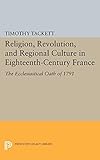Religion, Revolution, and Regional Culture in Eighteenth-Century France : The Ecclesiastical Oath of 1791 / Timothy Tackett.
Material type: TextSeries: Princeton Legacy Library ; 92Publisher: Princeton, NJ : Princeton University Press, [2014]Copyright date: ©1986Edition: Course BookDescription: 1 online resource (448 p.)Content type:
TextSeries: Princeton Legacy Library ; 92Publisher: Princeton, NJ : Princeton University Press, [2014]Copyright date: ©1986Edition: Course BookDescription: 1 online resource (448 p.)Content type: - 9780691610962
- 9781400854370
- 944.04/1 23
- online - DeGruyter
- Issued also in print.
| Item type | Current library | Call number | URL | Status | Notes | Barcode | |
|---|---|---|---|---|---|---|---|
 eBook
eBook
|
Biblioteca "Angelicum" Pont. Univ. S.Tommaso d'Aquino Nuvola online | online - DeGruyter (Browse shelf(Opens below)) | Online access | Not for loan (Accesso limitato) | Accesso per gli utenti autorizzati / Access for authorized users | (dgr)9781400854370 |
Frontmatter -- Table of Contents -- List of Tables -- List of Figures -- Preface -- Acknowledgments -- Abbreviations -- Part One. Introduction and Background -- ONE. The Oath and the French Revolution -- TWO. The Statistical Approach to the Oath: An Overview -- Part Two. The Clergy Confronts the Oath -- THREE. Clergymen Explain Their Oaths -- FOUR. Collective Portraits -- FIVE. The Ecclesiastical Milieu -- SIX. Clerical Politics -- Part Three. Frenchmen Confront the Oath -- SEVEN. Clerical Leadership and the Voice from Below -- EIGHT .The Oath as a Referendum -- NINE. The Protestant Menace -- TEN. Clericalism and the Oath -- ELEVEN. The Urban Elites and the Oath -- Part Four. Conclusions -- TWELVE. The Meaning of the Oath -- Appendices -- Appendix I: Note on Method and Sources -- Appendix II: Oath Statistics by Department and District -- Appendix III: Oath Statistics (Summary) -- Appendix IV: Estimated Oath-taking for Old-Regime Dioceses -- Appendix V: Incidence of Cure Collective Action, 1730-1786 -- Sources and Bibliography -- Index
restricted access online access with authorization star
http://purl.org/coar/access_right/c_16ec
The imposition of a loyalty oath on French clergymen in the winter of 1790 was a turning point in the Revolutionary decade after 1789. What is more, there is a remarkable similarity between the geography of this oath--the regional percentages of those who accepted or rejected it--and the geographic patterns of religious practice and political behavior persisting into the twentieth century. Timothy Tackett investigates the origins and nature of this fascinating phenomenon.Originally published in 1986.The Princeton Legacy Library uses the latest print-on-demand technology to again make available previously out-of-print books from the distinguished backlist of Princeton University Press. These editions preserve the original texts of these important books while presenting them in durable paperback and hardcover editions. The goal of the Princeton Legacy Library is to vastly increase access to the rich scholarly heritage found in the thousands of books published by Princeton University Press since its founding in 1905.
Issued also in print.
Mode of access: Internet via World Wide Web.
In English.
Description based on online resource; title from PDF title page (publisher's Web site, viewed 30. Aug 2021)


